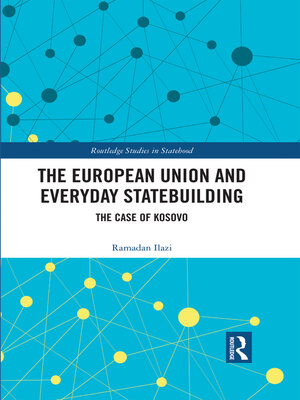The European Union and Everyday Statebuilding
ebook ∣ The Case of Kosovo · Routledge Studies in Statehood
By Ramadan Ilazi

Sign up to save your library
With an OverDrive account, you can save your favorite libraries for at-a-glance information about availability. Find out more about OverDrive accounts.
Find this title in Libby, the library reading app by OverDrive.



Search for a digital library with this title
Title found at these libraries:
| Library Name | Distance |
|---|---|
| Loading... |
This book examines the European Union's everyday statebuilding practices, using the case of Kosovo as an example of how it uses informal practices to influence local actors.
The objective of the book is to explain how the EU operates as a statebuilding actor in the everyday context, outside its zone of comfort. It illustrates the EU's dynamics of dealing with the local actors through everyday practices, which are understood as informal means or practices of interaction with the local actors in the framework of three key issues of relevance for statebuilding process for the EU: rule of law, reforming public administration and resolving bilateral disputes. The book shows how the EU utilizes everyday practices to influence decision-making process on the part of the government in order to ensure a particular outcome, be that diffusing a norm or promoting its own interests; in doing so, it gives an important insight into what these interests actually are in practice. In providing an insight into how the EU works as a statebuilding actor in practice in the everyday context, it unmasks factors that facilitate the EU's influence on other countries that it considers to be 'ailing', such as Kosovo, in order to secure desired behaviours, decisions, and actions on the part of the local government. It also unmasks the EU's commitment to being an ethical actor by unearthing practices that undermine local agency, the practical intentions of the EU's statebuilding intervention approaches, and the reality that hides behind the façade of public statements on the part of the EU and the local government. In doing so, the book provides a new way to look at the EU as a statebuilding actor.
This book will be of interest to students of statebuilding, EU policy, Balkan politics and, International Relations.







